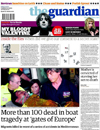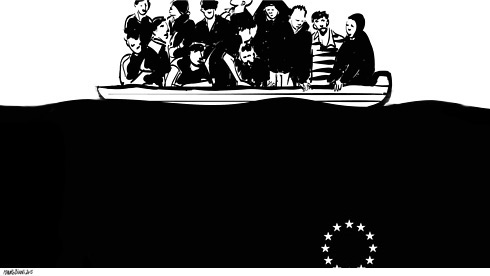“Immigrant slaughter, Italy in mourning”, headlines the Corriere della Sera. In a leader in the Milan daily, journalist Gian Antonio Stella recalls the large number of people who have drowned while trying to cross the Mediterranean since 1988: at least 19,142, according to immigration blog Fortress Europe. Stella also notes that shortly before the tragedy, the Council of Europe accused Italy of being a magnet for immigration because of its inadequate dissuasion systems, while other EU institutions regularly criticise “dissuasive” policies.

The same Europe that every day wants to meddle in our choices because they concern everybody is not eager to share with us the burden of southern frontiers. [...] Italian xenophobic claims are groundless. For every 1,000 people, nine of them are refugees in Sweden, seven in Germany, 4.5 in the Netherlands and just one in Italy. But these human waves cannot just be an Italian problem. They’re everyone’s business. [...] Brussels should come to Lampedusa and count the dead. They’re also theirs.
For the German weekly Der Spiegel, the sinking off Lampedusa is "the failure of Europe" –

The scenes must have been apocalyptic: 500 people leaping from a boat on fire, many of them unable to swim. What happened on [October 3] off the coast of the Mediterranean island of Lampedusa has made all of Europe tremble. [...] The small island feels abandoned, and not for the first time. Since 1999 more than 200,000 people from Africa and Asia, fleeing war, hunger and poverty, have washed up there. Estimates of how many have died trying to make the crossing run from 10 to 20,000. Since January 2013, 22,000 refugees have come ashore on Lampedusa. The island is a symbol – of the failure of the European immigration policy.
Taking a similar tone, El País headlines with “Illegal migrants’ tragedy shames Europe”. The Spanish daily reports that most of the sunken ship’s passengers were from Somalia and Eritrea and were fleeing due to hunger and war. Survivors declare that despite the SOS calls, three ships went by without changing their route to help them. For El País, “the crisis of people displaced [because of wars or hunger] shakes Europe” –

Just when there is a big shipwreck – and this last one is one of the biggest ever recorded – eyes turn to the 5,000 inhabitants on the island, whose mayor, fed up with deafness of Italian and European authorities, last February sent a letter to the European Union where she demanded to know: ‘How big does my island’s graveyard have to be?’
Under the headline “Lampedusa’s drowning”, Gazeta Wyborcza notes that the “Sicilian strait has become a grave for Africans who dreamed of European paradise.” The daily suggests a solution to ease pressure on Italy and Greece, also flooded with immigrants, would be to fast track immigrants to centres in other EU countries, where their applications could be examined. However, when such a proposal was floated recently in Brussels, non-Mediterranean states including Poland “would not hear of it.” Gazeta concludes that –

We Europeans are not doing enough to prevent such tragedies [...] Neither Italians nor other Europeans want illegal, uneducated and poor immigrants. Making the Mediterranean Sea monitoring system, which is supervised by Brussels, more effective in order to save drowning people is an uphill struggle.
In De Volkskrant, columnist Sheila Sitalsing, describing the hypocrisy that reigns in Europe, deplores the fact that the EU's immigration policy boils down to –

Argue, deny any responsibility, and look away. The countries of southern Europe have been trying painstakingly for many years to get their huge problems of immigration onto the agenda of Brussels, warning: "We cannot continue to welcome them, we cannot let them more of them die, and we cannot send them back – so help us!" And the countries of the north replied: “In any event, we must fend them off, for God’s sake!" Certainly, we find the war in Syria abominable, as we do the sometimes unpleasant events on the African continent, and we support the Arab Spring. But above all, we do not want this to be interpreted as an invitation to settle en masse in Amsterdam, Paris or Berlin.
“More than 100 dead in boat tragedy at ‘gates of Europe’”, headlines The Guardian. Condemning the fact that, “These days, it takes a blockbuster tragedy for migrant boats to reach the front pages,” the London daily’s foreign correspondent Jack Shenker argues there is a split between those people who believe Europe’s top priority should be to save the lives of would-be migrants, and those who believe the priority to be border enforcement.

There still remains an absence of political will when it comes to ensuring that vulnerable migrants don't fall through the cracks of an intricate set of border and rescue policies and overlapping regions of legal jurisdiction.
In its editorial, Lisbon daily Público uses the headline: “Lampedusa and Europe’s shame”. It continues –

The Mediterranean, a sea which has been a crossroads and centre of civilization since ancient times, was turned into an extermination camp. On its banks, the Pope once said that only indifference grew. Indifference to death and tragedy. ‘There is no miracle solution,’ said Italian Foreign Affairs Minister Emma Bonino. There is no miracle. But a Europe wracked by fear and crisis that closes itself off to others will no longer be Europe if it fails to understand that this death on the Mediterranean is its own death.
Was this article useful? If so we are delighted!
It is freely available because we believe that the right to free and independent information is essential for democracy. But this right is not guaranteed forever, and independence comes at a cost. We need your support in order to continue publishing independent, multilingual news for all Europeans.
Discover our subscription offers and their exclusive benefits and become a member of our community now!












